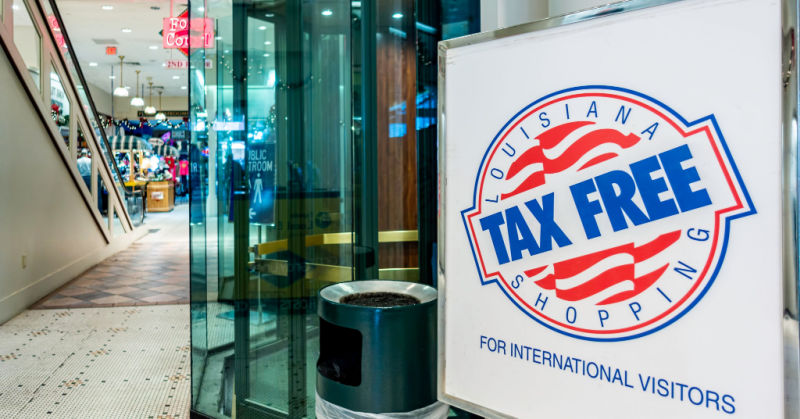If you’ve ever dealt with sales and use taxes in Louisiana, you’ll probably agree they can be a bit… cumbersome. That complexity comes not from the state tax scheme but from a cacophony of local taxes. Local taxes are levied at the parish level as well as the intra-parish level—from cities to school boards.
If you’re thinking this seems like a lot to contend with, you’re not alone. The state legislature seems to be aware of the issues as well. For the past 30 years or so, there has been an ongoing legislative effort to streamline local sales taxes, though they have little to show for it. The primary roadblock is the fact that the authority locals must levy and collect sales taxes is enshrined not only in the statutes but in the state constitution itself.
Nevertheless, the fight continues—in the legislature and in the courts—to bring this streamlining effort to fruition. In this article, we will take a look at some of Louisiana’s past and current streamlining efforts, as well as an ongoing legal battle.
Louisiana’s streamlining quest
Louisiana has indeed made significant progress in its streamlining efforts. The state moved to a single sales tax collector for each parish in 1991, created the Uniform Local Sales Tax Code in 1998, and created the local sales tax division within the Board of Tax Appeals in 2014. Despite these efforts, issues with the state and local tax system persist, as does Louisiana’s quest for more streamlined sales taxes.
In 2015, the legislature enacted Act 405, which created the Sales Tax Streamlining and Modernization Commission to study the state and local sales tax structure. In doing so, the legislature recognized that there are “significant structural issues” impacting state and local sales taxes, which are a significant source of state revenue and the main revenue source for local governments. The commission was to submit an interim report in 2016, a final report “prepared as determined by the commission” and was set to terminate in 2017. Recognizing that the structural issues persisted, the termination date was extended to 2018 and later to 2019.
Meanwhile, in 2017, Act 274 was enacted, creating the Louisiana Uniform Local Sales Tax Board and Louisiana Sales and Use Tax Commission for Remote Sellers “for purposes of uniformity and efficiency of imposition, collection, and administration of local sales and use taxes.” Each group was given a host of powers and duties, but they both remain limited by the state constitution in terms of what they are able to do.
Interestingly though, the Sales and Use Tax Commission for remote sellers was given the authority to “serve as the single state … agency to represent both state and local taxing authorities in taking appropriate action to enable Louisiana to participate in programs designed to allow Louisiana to more efficiently enforce and collect state and local sales and use taxes on sales made by remote sellers.” Despite language in the act stating that it shall not be construed to “[m]ake the state of Louisiana a member of the Streamlined Sales and Use Tax Agreement,” it seems that the legislature may be looking toward membership in the future. Of course, that will never be possible under the current Louisiana Constitution, as drastic structural changes would be necessary to align with the fundamental hallmarks of simplification required of its members. This includes state-level administration of sales and use taxes, uniform state, and local tax base and filing mandates.
After a failed attempt to create yet another task force to make recommendations for changes in 2020, the legislature made a play for truly substantive changes to the tax system in 2021. Act 131 put a question on the ballot for voters to approve or reject an amendment to the state constitution to create the State and Local Streamlined Sales and Use Tax Commission.
The commission would have been tasked with providing for the streamlined electronic filing, electronic remittance, and collection of sales and use taxes levied within the state, issuing policy advice relative to sales and use taxes levied by all taxing authorities within the state, and developing rules, regulations and guidance to simplify and streamline the audit process. More importantly, any law enacted pursuant to those duties would supersede local constitutional taxing authority. “Beginning on the effective date of such law, [relevant conflicting] provisions… of this Constitution shall cease to be effective and shall be inapplicable, inoperable, and of no effect for the limited purposes of the commission's duties.” Unfortunately, the ballot question failed, and the commission was never created. But, undeterred, the legislature battles on.
The quest continues
In a minor victory, Louisiana enacted Act 596, which requires the Uniform Local Sales Tax Board to implement and coordinate the multi-parish audit system. However, this is far from structural change.
There was also another attempt at ballot questions for constitutional amendments that made its way through the legislature. House Bill 681 would have put ballot questions to voters this November to once again approve or reject constitutional amendments for the creation of the State and Local Streamlined Sales and Use Tax Commission. Like those in Act 131, these amendments would have given the commission and legislature the authority to enact regulations and legislation that would supersede constitutional provisions providing for local taxing authority. Sadly, we won’t get to find out whether the voters of Louisiana would have approved the amendments. House Bill 681 never made it to the governor’s desk. Perhaps we’ll see proposals for similar constitutional amendments in future sessions.
A battle in the courts
In the meantime, the battle continues in the courts. In November 2021, Arizona company Halstead Bead, Inc. filed a lawsuit in federal court challenging the constitutionality of Louisiana’s sales and use tax laws for remote sellers. Halstead Bead is not challenging the taxes themselves. Rather, the company argues that the “arbitrary and fragmented” sales tax scheme violates the Commerce Clause by being unduly burdensome and the Due Process Clause by lacking any reasonable relationship with the value gained. The district court dismissed the complaint on jurisdictional grounds saying that it should be heard in state court. Halstead has appealed the dismissal to the Fifth Circuit, asking the court to reverse the district court ruling so that the complaint can be heard on the merits. It will be interesting to see how this litigation plays out.
Where does this leave us?
In the end, significant structural issues with state and local sales taxes continue to impact anyone doing business in Louisiana, and provisions of the state constitution remain a significant roadblock to any significant streamlining efforts. That said, progress has been made in simplifying compliance, particularly for remote sellers.
The Sales and Use Tax Commission for Remote Sellers was given the authority to serve as the single entity responsible for all state and local sales and use tax administration, return processing and audits for remote sales sourced to Louisiana, as well as the single agency to which remote sellers shall make state and local sales and use tax remittances. The commission maintains an online filing portal for this purpose. Additionally, the Uniform Local Sales Tax Board offers several services through its online portal, including a bulk tax rate lookup tool and ways to submit Voluntary Disclosure Agreements, as well as multi-parish audit requests and refund claims. There is also a public version of the tax rate tool that does not require an account. Finally, the Louisiana Association of Tax Administrators hosts information and services to assist taxpayers.
So, while Louisiana continues its quest for sales tax simplification, taxpayers must continue to contend with a complicated sales and use tax system. But, while the system is cumbersome, it is not insurmountable, and there are several resources available to make tax compliance in Louisiana at least manageable.
To learn more about managing compliance with the SST Model 1 program and discover participating states, check out this fact sheet.
.png?width=150&height=63&name=TWRlogo-regmark_blueblack%20(1).png)
.png)










Do you have questions about this article? Email us and let us know > info@woodard.com
Comments: